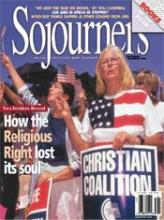Pristina, Kosovo—At the Macedonia-Kosovo border, kids on the roadside are selling Coke and fresh brown eggs. They are swept with a metal detector every time they cross the invisible line between countries. Their arms-up gesture is automatic. The raised shoulders next to the road are covered with wild flowers—blue chicory, yellow lupines, bull thistles—and land mines. Men swing scythes through grain and hay. Where the fields are not yet clear of mines, farmers send in the cattle first. German soldiers lounge on tanks, casually pointing anti-rocket guns at the sky. The houses are pockmarked with bullets and small mortar fire. The roofs are burned off.
We meet Terry Heselius at the Mercy Corps office in Pristina. Mercy Corps began working there in 1993. Heselius’ first project in the region was to deliver 40 tons of flour from Budapest to Pristina. The trucks had to go to Supotisa, Novi Sad, Belgrade, Nis, and finally Pristina. After the first convoy, Mercy Corps sent 250 tons per week. Every one of the trucks was prayed over. Theirs was the only relief agency that managed to get trucks through.
According to Heselius, Kosovar president Ibrahim Rugova is the region’s only hope. Rugova once asked Heselius what the answer was for Kosovo. Heselius quoted 2 Chronicles 7:14. "If my people who are called by my name will humble themselves and pray and seek my face and turn from their wicked ways, then will I hear from heaven and will forgive their sin and will heal their land."
This kind of conversion does three things—it lifts hearts and combats despair, it teaches forgiveness, and it undercuts propaganda and fear. Economic and political reconstruction is essential in Kosovo, but it must be built on a foundation of spiritual reconstruction.
Read the Full Article
